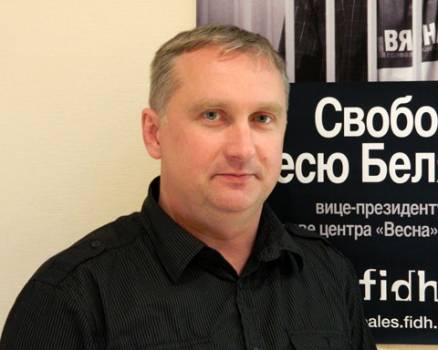Pavel Sapelka: I’ve always been alarmed by outstanding achievements of justice statistics
Summing up the results of 2014, Chairman of the Supreme Court Valiantsin Sukala and Deputy Chairman Valery Kalinkovich said during a meeting of the Presidium of the Supreme Court on 11 February that the legal and judicial reforms currently enforced in the country yielded positive results, and the chosen strategy and model of the national justice were correct.
In particular, Valery Kalinkovich noted that in the conditions of formation of the judicial system of Belarus in its new role the courts ensured open access to justice, rule of law when considering the majority of cases. For example, in 2014 there were no cases of unjustified conviction of citizens. There still remained generally balanced approach to sentencing in criminal cases, the use of institutions of exemption from criminal liability.
Human rights defender Pavel Sapelka notices quite different, more prosaic notes through the noise of bureaucratic fanfare:
“I’ve always been alarmed by the outstanding achievements of the Belarusian justice statistics. The chairmen of the Supreme Court report and are proud of the fact that in 2014 there were no cases of unjustified conviction of citizens. You can call this achievement somewhat differently: not a single wrongfully convicted person achieved the abolition of the sentence imposed in 2014! This is especially sad against the background of sentences to 852 persons in previous years. The system cannot become perfect so quickly, and I think that these “achievements” only demonstrate a decrease in chances for the restoration of justice”.
The website of the Supreme Court cites the following figures: in 2014, sentences of 852 persons were canceled as a result of appeals or supervisory reviews, 1,694 decisions in civil cases and judicial decisions on 287 cases heard by economic courts (in 2013 – 861, 1,775 and 316, respectively) and in administrative trials.
Commenting on these statistics, Pavel Sapelka doubts the excellent work of Belarusian courts:
“I, for example, would not be alarmed by a high percentage of cancellations and changes in judgments, decisions and rulings. This means that the system is alive, open to alternative views and free from fear of admitting a mistake. With such approaches, a citizen has a reasonable assurance that the error, omission or abuse of the judges will be the subject of an objective assessment of a higher court. Otherwise, the accused, either objectively or subjectively, finds himself in a trap, he will either not write useless complaints or his complaints will return with a formal reply that the previous court rulings are lawful and justified. So the statement that the courts worked almost flawlessly is a kind of indulgence to judges, an approval of their performance”.
To confirm his words, Sapelka refers to the case of Mikhail Hladki:
“Here is an example of Mikhail Hladki. All the elements of the system of law enforcement should be ashamed for the fate of this man: police officers, investigators, experts, lawyers, judges. I do not want to say that he was exemplary. A little man in every sense of the word... When he was arrested, and later, during the investigation and in court, he said what he knew about the case: struck with an ax what later turned out to be a dead body. Nothing invented or added – as they say, he surrendered himself to justice, he was ready to be responsible for his actions. And the whole system rolled along the familiar track: pleaded guilty – found guilty. And they did not found it necessary to smooth even the most obvious “corners”, did not care to develop the simplest alternative versions – why waste time – 7 years in prison, including five – in the colony, ruined family, broken lives. And in the end, a rigid refusal to recognize the right to compensation. Not to compensate for any particular moral damage to a certain amount - no, in principle, the right to compensation! Someone expecting a different result? I confess that I did. But it was alarming that back in April 2014 the Supreme Court told that the payment was not allowed to him... What should the judge do after that? Take his own decision?”


















